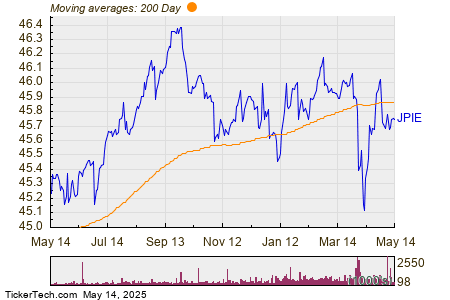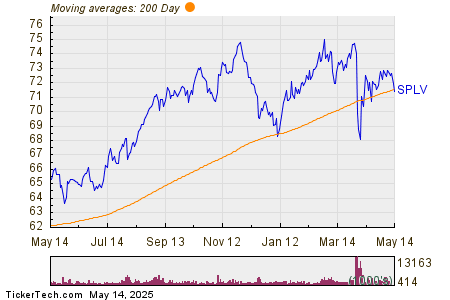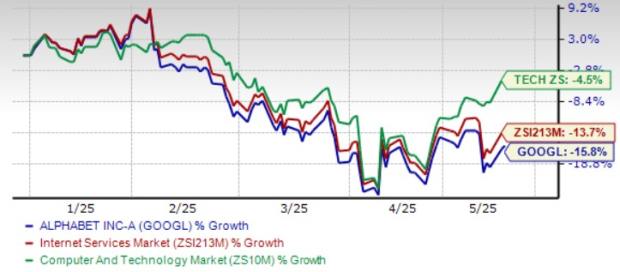Investors Eye Long-Term Picks Amid U.S. Market Volatility in 2025
The U.S. equity market has faced significant volatility in 2025 as investors express concerns about a possible recession due to escalating trade wars. However, this period of uncertainty can benefit long-term investors. By ignoring short-term fluctuations, they can invest in companies benefiting from secular growth trends, robust competitive advantages, and increasing profitability.
Companies like Meta Platforms (NASDAQ: META), Microsoft (NASDAQ: MSFT), and Palantir Technologies (NASDAQ: PLTR) are expected to follow strong growth paths. Here’s an analysis of why these stocks are worth considering now.
Meta Platforms
Under the leadership of CEO Mark Zuckerberg, Meta is emphasizing artificial intelligence (AI) innovation and effective cost management. This strategy has reinforced its status as a leader in digital advertising. Recent quarterly results exceeded consensus estimates for both revenue and earnings.
Meta’s vast user base of 3.4 billion offers significant advantages. Access to extensive first-party data allows the company to train AI models, enhancing user experiences across its platforms. Over the past six months, AI-driven recommendations increased user engagement: time spent on Facebook grew by 7%, Instagram by 6%, and Threads by 35%.
Greater user engagement translates to improved conversion rates for advertisers. The Generative Ads Recommendation Model enhances ad targeting, creating a competitive edge that others find hard to replicate.
Despite its strengths, Meta’s shares trade at 21.5 times forward earnings, a reasonable valuation for a company with expanding profit margins, $70.2 billion in cash, and $28.8 billion in debt. These factors make it a potentially strong buy-and-hold investment.
Microsoft
Microsoft boasts a diversified business model that positions it as an attractive long-term investment. Recent earnings showed that the company exceeded revenue and earnings estimates, demonstrating resilience in a challenging economic environment.
One key metric, commercial remaining performance obligations (RPO), rose 34% year over year to $315 billion. Microsoft’s AI integration strategy has been particularly successful, with its Azure cloud platform reporting 33% year-over-year growth; AI services contributed 16 percentage points to that growth. The fourth quarter forecast also anticipates Azure revenue will increase 34%-35% in constant currency terms.
Microsoft commands 22% of the global cloud infrastructure market, second only to Amazon‘s AWS at 29%. Rapid enhancements in data center capacity and model capabilities are likely to help capture an even larger market share.
Furthermore, Microsoft 365 Copilot, an AI-driven virtual assistant, is seeing a threefold year-over-year increase in customer adoption. The company’s Copilot Studio aids over 230,000 organizations, including many Fortune 500 companies, in creating customized AI solutions. These advancements reinforce Microsoft’s competitive position.
Currently, Microsoft shares trade at 26.2 times forward earnings, notably below their five-year average of 33. With strong revenue growth and a solid balance sheet—$79.6 billion in cash—Microsoft is an appealing investment option at present valuations.
Palantir Technologies
Palantir Technologies has transformed from a data analytics contractor primarily serving government clients to a major provider of AI-powered operating systems for enterprises. The company enables clients to analyze vast amounts of organizational data, deriving actionable insights.
In its first fiscal quarter of 2025, Palantir reported a 39% year-over-year revenue increase, reaching $884 million. U.S. revenue surged by 55%, accounting for 71% of total revenue. Additionally, U.S. commercial revenue climbed 71%, surpassing a $1 billion annual run rate.
Palantir’s Artificial Intelligence Platform (AIP) is experiencing high demand, distinguishing itself by focusing on real-time AI solutions deployed securely. Its proprietary ontology system helps clients understand the complex dynamics of their operations, even amidst fragmented data.
As Palantir evolves from a software provider to a company offering integrated software and hardware solutions, it is already launching innovations like TITAN (Tactical Intelligence).
Palantir’s Rise Amid Defense Budget Growth: A Closer Look
Palantir Technologies is advancing its Positioning Access Node (PAN) systems, which utilize AI and machine learning to link soldiers on the battlefield with data sourced from multiple sensors. This innovation positions Palantir to secure a substantial share of the projected $1 trillion defense budget for 2026.
Valuation Insights: Palantir’s Market Position
Currently, Palantir is trading at 208 times forward earnings, a stark contrast to its five-year average of 145. While this valuation may seem high, it can be justified by the historical performance of growth companies. Such firms, known for exceptional long-term growth potential, frequently command elevated valuations. Therefore, even at these levels, investors might consider acquiring a small stake in Palantir.
Examining Investment Opportunities
Before making a decision on investing in Meta Platforms, keep a few factors in mind:
Historical Performance of Recommended Stocks
Recently, the Motley Fool analyst team highlighted ten stocks they believe are prime for investment, notably excluding Meta Platforms. The identified stocks are projected to yield substantial returns over the coming years. For instance, consider Netflix, which made a similar recommendation list on December 17, 2004. An investment of $1,000 then would be valued at about $613,951 today. Similarly, Nvidia was suggested on April 15, 2005, and a $1,000 investment back then would be worth around $796,353 now.
It is essential to note that the average returns for the Motley Fool’s recommendations sit at an impressive 948%, outpacing the S&P 500’s 170%. Investors are encouraged to explore the latest top ten list available through the service.
Disclaimer: The views expressed in this article are those of the author and do not necessarily reflect the opinions of Nasdaq, Inc.





